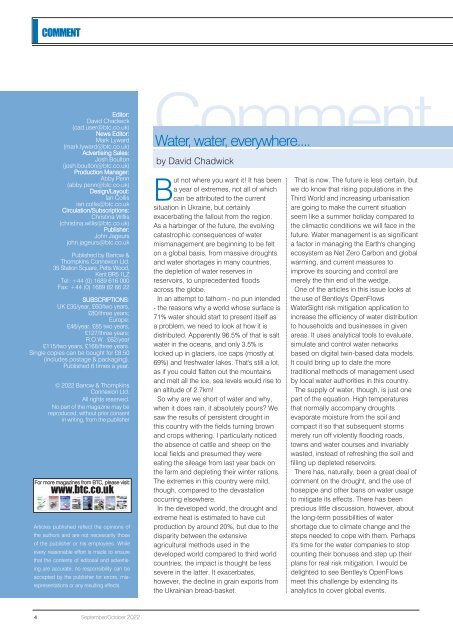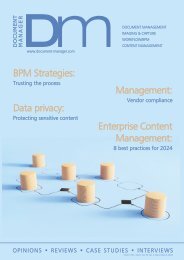CU Sep-Oct 2023
You also want an ePaper? Increase the reach of your titles
YUMPU automatically turns print PDFs into web optimized ePapers that Google loves.
COMMENT<br />
Editor:<br />
David Chadwick<br />
(cad.user@btc.co.uk)<br />
News Editor:<br />
Mark Lyward<br />
(mark.lyward@btc.co.uk)<br />
Advertising Sales:<br />
Josh Boulton<br />
(josh.boulton@btc.co.uk)<br />
Production Manager:<br />
Abby Penn<br />
(abby.penn@btc.co.uk)<br />
Design/Layout:<br />
Ian Collis<br />
ian.collis@btc.co.uk<br />
Circulation/Subscriptions:<br />
Christina Willis<br />
(christina.willis@btc.co.uk)<br />
Publisher:<br />
John Jageurs<br />
john.jageurs@btc.co.uk<br />
Published by Barrow &<br />
Thompkins Connexion Ltd.<br />
35 Station Square, Petts Wood,<br />
Kent BR5 1LZ<br />
Tel: +44 (0) 1689 616 000<br />
Fax: +44 (0) 1689 82 66 22<br />
SUBSCRIPTIONS:<br />
UK £35/year, £60/two years,<br />
£80/three years;<br />
Europe:<br />
£48/year, £85 two years,<br />
£127/three years;<br />
R.O.W. £62/year<br />
£115/two years, £168/three years.<br />
Single copies can be bought for £8.50<br />
(includes postage & packaging).<br />
Published 6 times a year.<br />
© 2022 Barrow & Thompkins<br />
Connexion Ltd.<br />
All rights reserved.<br />
No part of the magazine may be<br />
reproduced, without prior consent<br />
in writing, from the publisher<br />
For more magazines from BTC, please visit:<br />
www.btc.co.uk<br />
Articles published reflect the opinions of<br />
the authors and are not necessarily those<br />
of the publisher or his employees. While<br />
every reasonable effort is made to ensure<br />
that the contents of editorial and advertising<br />
are accurate, no responsibility can be<br />
accepted by the publisher for errors, misrepresentations<br />
or any resulting effects<br />
Comment<br />
Water, water, everywhere....<br />
by David Chadwick<br />
But not where you want it! It has been<br />
a year of extremes, not all of which<br />
can be attributed to the current<br />
situation in Ukraine, but certainly<br />
exacerbating the fallout from the region.<br />
As a harbinger of the future, the evolving<br />
catastrophic consequences of water<br />
mismanagement are beginning to be felt<br />
on a global basis, from massive droughts<br />
and water shortages in many countries,<br />
the depletion of water reserves in<br />
reservoirs, to unprecedented floods<br />
across the globe.<br />
In an attempt to fathom - no pun intended<br />
- the reasons why a world whose surface is<br />
71% water should start to present itself as<br />
a problem, we need to look at how it is<br />
distributed. Apparently 96.5% of that is salt<br />
water in the oceans, and only 3.5% is<br />
locked up in glaciers, ice caps (mostly at<br />
69%) and freshwater lakes. That's still a lot,<br />
as if you could flatten out the mountains<br />
and melt all the ice, sea levels would rise to<br />
an altitude of 2.7km!<br />
So why are we short of water and why,<br />
when it does rain, it absolutely pours? We<br />
saw the results of persistent drought in<br />
this country with the fields turning brown<br />
and crops withering. I particularly noticed<br />
the absence of cattle and sheep on the<br />
local fields and presumed they were<br />
eating the sileage from last year back on<br />
the farm and depleting their winter rations.<br />
The extremes in this country were mild,<br />
though, compared to the devastation<br />
occurring elsewhere.<br />
In the developed world, the drought and<br />
extreme heat is estimated to have cut<br />
production by around 20%, but due to the<br />
disparity between the extensive<br />
agricultural methods used in the<br />
developed world compared to third world<br />
countries, the impact is thought be less<br />
severe in the latter. It exacerbates,<br />
however, the decline in grain exports from<br />
the Ukrainian bread-basket.<br />
That is now. The future is less certain, but<br />
we do know that rising populations in the<br />
Third World and increasing urbanisation<br />
are going to make the current situation<br />
seem like a summer holiday compared to<br />
the climactic conditions we will face in the<br />
future. Water management is as significant<br />
a factor in managing the Earth's changing<br />
ecosystem as Net Zero Carbon and global<br />
warming, and current measures to<br />
improve its sourcing and control are<br />
merely the thin end of the wedge.<br />
One of the articles in this issue looks at<br />
the use of Bentley's OpenFlows<br />
WaterSight risk mitigation application to<br />
increase the efficiency of water distribution<br />
to households and businesses in given<br />
areas. It uses analytical tools to evaluate,<br />
simulate and control water networks<br />
based on digital twin-based data models.<br />
It could bring up to date the more<br />
traditional methods of management used<br />
by local water authorities in this country.<br />
The supply of water, though, is just one<br />
part of the equation. High temperatures<br />
that normally accompany droughts<br />
evaporate moisture from the soil and<br />
compact it so that subsequent storms<br />
merely run off violently flooding roads,<br />
towns and water courses and invariably<br />
wasted, instead of refreshing the soil and<br />
filling up depleted reservoirs.<br />
There has, naturally, been a great deal of<br />
comment on the drought, and the use of<br />
hosepipe and other bans on water usage<br />
to mitigate its effects. There has been<br />
precious little discussion, however, about<br />
the long-term possibilities of water<br />
shortage due to climate change and the<br />
steps needed to cope with them. Perhaps<br />
it's time for the water companies to stop<br />
counting their bonuses and step up their<br />
plans for real risk mitigation. I would be<br />
delighted to see Bentley's OpenFlows<br />
meet this challenge by extending its<br />
analytics to cover global events.<br />
4 <strong>Sep</strong>tember/<strong>Oct</strong>ober 2022

















